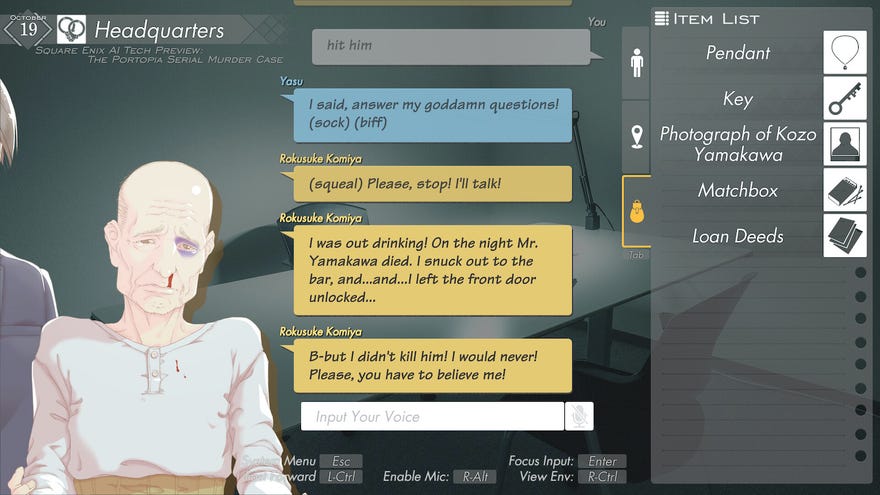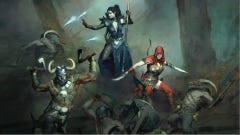Square Enix turns Dragon Quest creator's classic visual novel into an odd "AI Tech Preview"
If only The Portopia Serial Murder Case came out a year later, the 1984 jokes would write themselves
In the summer of 1983, publisher-that-was Enix released a murder mystery visual novel called The Portopia Serial Murder Case. Designed by Dragon Quest’s creator Yuji Horii, it never saw a release outside of Japan - until now. Square Enix are re-releasing the classic on Steam in two days, calling it an “AI tech preview,” and tacking on “natural language processing” technology, in perhaps the oddest port I’ve seen so far.
In 1983's version you didn’t interact with The Portopia Serial Murder Case through preset dialogue choices, unlike most visual novels today. Instead, you’d type commands to interact with characters, and finding the right combo of nouns and verbs was part of the game’s unique puzzle-solving as you tried to solve the mystery. Multiple endings, a non-linear structure, and a still eyebrow-raising gimmick made it a quite popular release, going on to influence other iconic devs such as Hideo Kojima.
Square Enix aren’t even calling the new version a game anymore - it’s now an “AI tech preview,” or an “educational software demonstration.” Squeenix are experimenting with a bunch of weird tech here, so let’s run through them quickly.
There’s NLP (natural language processing) that lets computers gain meaning from the natural language that we often use. NLP isn’t enough for a computer to truly understand what we’re saying though; that’s where NLU (natural language understanding) comes into play which “aims to make computers correctly understand natural language.” In the game (if I’m still allowed to call it that) NLU is being used for your junior detective, so he can better understand your written commands.
The final experimental tech that Square references is called NLG, the natural language generation you might be familiar with from viral AI chatbots such as ChatGPT. After understanding what we human folk are trying to say, language generation would help AI to “generate responses comparable to those written by human beings,” and Square threaten that it’s already being used “in place of human operators.”
Square say that language generation was implemented into the game’s re-release, but it’s been removed because of the risk of “unethical replies.” Although, the publisher that thinks blockchain is a good idea will “consider reintroducing this function” in the future.
I’m all for bringing back old games lost to time or localising games that never reached a worldwide audience, but using them to experiment with the future of AI feels like the slimiest way to go about that. Square’s vision for the future, based on this AI test, would seemingly strip the humanity out of games, replacing art created by real people with randomness generated by AI. Square’s allergy to the word “game” is just proof of that. The Portopia Serial Murder Case was a game, made by game designers, playable on the Super Famicom game console. Now it looks like cost-cutting research.
Anyway, AI-generated writing tools were in the news recently when Ubisoft unveiled Ghostwriter. It was marketed as a development tool used to generate first drafts of dialogue and it sparked a fair bit of backlash.









